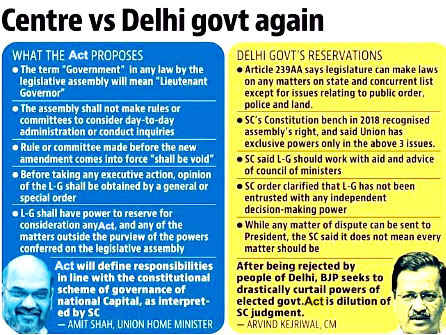Indian Polity
New Delhi Dual Governance Conundrum
- 02 May 2022
- 6 min read
For Prelims: 69th amendment to the Constitution of India
For Mains: New Delhi Government vs Union Government, Government of NCT of Delhi (Amendment) Act, 2021, Co-operative Federalism, Constitutional Amendments
Why in News?
Due to the absence of statehood for Delhi, there has been a prolonged confrontation on the relative powers between the elected government of New Delhi and Lieutenant Governor (L-G) (appointed by the Union Government) for the territorial administration of New Delhi.
- The dispute between the two occurred on many occasions including control over agencies, namely the Anti-Corruption Bureau, the Civil Services and the Electricity Board, etc.
- Further, the 2021 amendment to the Government of National Capital Territory of Delhi Act,1991, points out that the possibility of conflict is not over.
What is the Governance Model of New Delhi?
- The status of Delhi being a Union Territory under Schedule 1 of the Constitution but christened the ‘National Capital Territory’ under Article 239AA, engrafted by the Constitution (69th Amendment) Act.
- The 69th amendment to the Constitution of India inserted Article 239AA, which declared the Union Territory of Delhi to be administered by a L-G who works on aid and advice of the elected legislative assembly.
- However, the ‘aid and advice’ clause pertains only to matters on which the elected Assembly has powers under the State and Concurrent Lists With the exception of public order, police, and land.
- Further, the Article 239AA also notes that L-G has to either act on the aid and advice of the Council of Ministers, or he is bound to implement the decision taken by the President on a reference being made by him.
- Also, Article 239AA, empowers the L-G to refer a difference of opinion on ‘any matter’ with the Council of Ministers to the President.
- Thus, this dual control between L-G and the elected government leads to a power tussle.
What is the Judiciary’s Opinion on this matter?
- The Delhi High Court decided in favour of the Central Government relying on the status of Delhi as a Union Territory.
- However, the Supreme Court referred the matter to a Constitution Bench to decide on the substantial questions of law pertaining to the powers of the elected government of Delhi vis-a-vis the Lieutenant Governor (L-G).
- The case referred to the Constitutional bench is known as NCT vs UOI case, 2018. The five-judge Bench opened a new jurisprudential chapter in the Administration of NCT.
- Purposive Construction: The court invoked the rule of purposive construction to say that the objectives behind the Constitution (69th Amendment) Act shall guide the interpretation of Article 239AA.
- This means the principles of federalism and democracy into Article 239AA, thereby finding a parliamentary intent to accord a sui generis (of its own kind) status in distinction from other Union Territories.
- L-G to Act on Aid and Advice: The Court declared that the L-G is bound by the “aid and advice” of the Council of Ministers, noting that the Delhi Assembly also has the power to make laws over all subjects that figure in the Concurrent List, and all, except three excluded subjects, in the State List.
- The L-G ought to act on the “aid and advice” of the Council of Ministers, except when he refers a matter to the President for a final decision.
- Any Matter is Not Every Matter: Regarding the L-G’s power to refer to the President any matter on which there is a difference of opinion between L-G and the Council of Ministers, the Supreme Court ruled that “any matter” cannot be construed to mean “every matter”, and such a reference shall arise only in exceptional circumstances.
- L-G as facilitator: L-G shall act as a facilitator rather than anointing himself as an adversary to the elected Council of Ministers.
- New Delhi Cannot be Given Statehood: At the same time, the Court ruled that the National Capital Territory of Delhi cannot be granted the status of a State under the constitutional scheme.
- Purposive Construction: The court invoked the rule of purposive construction to say that the objectives behind the Constitution (69th Amendment) Act shall guide the interpretation of Article 239AA.
Way Forward
- Working Through Constitutional Trust: The apex court had rightly concluded that the scheme set out in the Constitution and the Government of National Capital Territory of Delhi Act, 1991 envisages a collaborative structure that can be worked only through constitutional trust.
- Ensuring Principle of Subsidiarity: Subsidiarity — the foundational principle of fiscal federalism — necessitates empowered sub-national governments.
- Therefore, the central government should move towards allocating greater powers to city governments.
- In this context, India should emulate several large megapolis around the globe, from Jakarta and Seoul to London and Paris, which have had strong sub-national governments.







